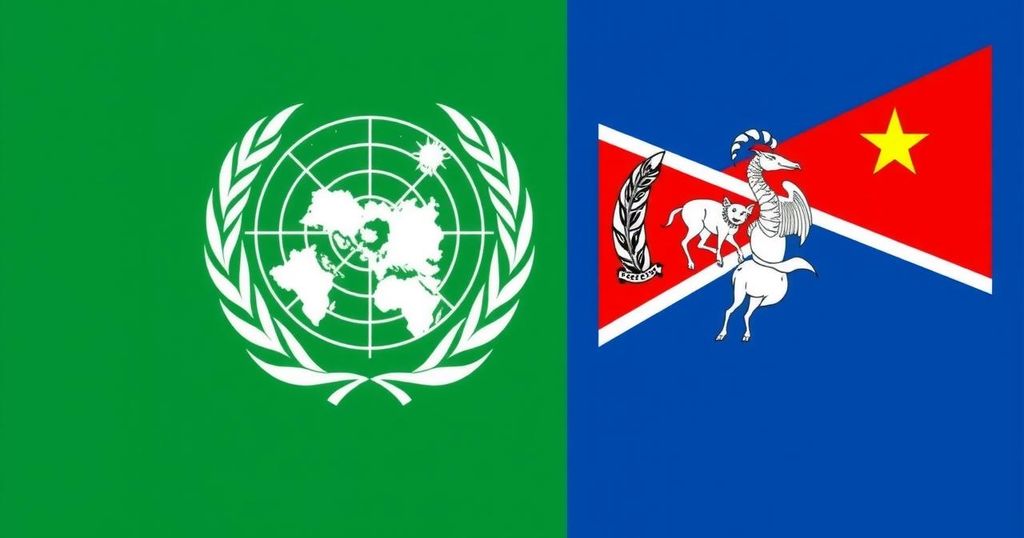Papua New Guinea has declared its intention to boycott the upcoming UN climate summit, COP29, describing it as ineffective and a “waste of time.” Foreign Minister Justin Tkatchenko criticized the historical lack of substantial outcomes from these negotiations. Instead, PNG plans to pursue bilateral climate agreements with nations like Singapore, seeking more effective solutions to climate issues exacerbated by global polluters.
Papua New Guinea (PNG) has announced its decision to boycott the upcoming UN climate summit, COP29, scheduled for November in Azerbaijan, dismissing the event as a “waste of time” filled with empty pledges from major polluters. This declaration comes from Foreign Minister Justin Tkatchenko, who expressed frustration over the lack of substantial outcomes from past summits, remarking, “There’s no point going if we are falling asleep because of jet lag because we’re not getting anything done.” Tkatchenko emphasized that while many large countries promise support for climate initiatives, these commitments often fail to translate into meaningful action, stating, “All the big polluters of the world promise and commit millions to assist in climate relief… And I can tell you now it’s all going to consultants.” PNG, known for its vast rainforests, is on the frontline of climate vulnerability and has long been regarded as a crucial player in global ecological health. However, the nation is disillusioned with the current framework of COP negotiations that appear ineffective in securing immediate climate relief. Criticism of the COP meetings is not new; however, PNG’s outright refusal to participate is noteworthy. The Foreign Minister lamented, “COP is a total waste of time,” expressing concern over the repetitive nature of discussions that yield little progress over recent years. He highlighted the significant role of PNG as one of the world’s largest rainforest nations, asserting, “We are sucking up the pollutants of these major countries. And they are getting away with it scot-free.” Papua New Guinea’s stance echoes a broader frustration among smaller nations that feel marginalized in international climate discussions. The country aims to initiate its own climate agreements with allies, such as Singapore, remarking that bilateral negotiations could be far more effective than those undertaken during the COP summits. Tkatchenko defended this shift, stating, “With like-minded countries like Singapore, we can do 100 times more than COP.” The decision to withdraw from COP29 has garnered support among other Pacific nations, positioning PNG as a vocal advocate for those who are struggling against climate change effects. The ministry’s initiative reflects an urgent call for actions that yield tangible results for environmentally vulnerable states.
The annual UN climate conferences, known as COP (Conference of the Parties), serve as the primary forum for countries to negotiate binding commitments regarding climate change. These summits have historically involved significant dialogue among nations but have faced scrutiny for the perceived ineffectiveness in addressing the climate crisis, particularly in light of the promises made by industrialized nations. Papua New Guinea, rich in biodiversity and possessing vast rainforests, occupies a critical role in global climate health, making its leaders’ concerns particularly salient. The island nation, already facing the impacts of climate change—such as rising sea levels and extreme weather events—has expressed discontent with the pace and results of climate negotiations, indicating a need for alternative approaches tailored to the specific needs of vulnerable nations.
In summary, Papua New Guinea’s decision to boycott the forthcoming UN climate summit underscores deep frustrations with the ineffectiveness of multilateral climate negotiations. The assertion by Foreign Minister Justin Tkatchenko highlights the urgent need for actionable outcomes rather than continued empty rhetoric. PNG’s pivot towards bilateral agreements aims to foster more meaningful partnerships and drive significant climate action needed to protect vulnerable nations facing the imminent threats of climate change.
Original Source: www.independent.co.ug






